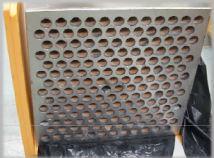High Efficiency Particulate Air (HEPA) filters are widely used commercial products to remove airborne particulates from a gas stream in a gas process system or ventilation system. Filter life span is determined by filter design and materials. Existing HEPA filters are made from glass fiber, which is fragile and easily damaged. They are subject to handling errors. Shelf life is reduced by contact with moisture. They are damaged by high pressures, chemical attack, high temperature, and fire. Alternative technologies face challenges with weight, strength, flow rate, and pressure drop. Alternative technologies also face challenges with life cycle cost, support system cost, regulatory scrutiny, radiolysis, weight, strength, flow rate, and pressure drop. Sand filters are not an economical option for many industries (e.g., biotech). Teflon© filters recently encountered regulatory issues which have limited their application.
A ceramic HEPA filter designed to meet commercial and DOE requirements, as well as to minimize upgrade installation logistics for use in existing facilities. Current key performance requirements are described in DOE Standard 3020. The ceramic filter is designed to be nonflammable, corrosion resistant, and compatible with high temperatures and moisture. The ceramic filter will significantly increase filter life span and reduce life cycle costs, and open up new opportunities for overall process gas system and ventilation system design.
Advantages include: specialty application processes could be significantly improved by a ceramic HEPA filter with NBC performance characteristics exceeding that of traditional, non-ceramic filters, ceramic HEPA filter will minimize retrofit problems and costs while meeting requirements, industries utilizing fume hoods and glove boxes can benefit from a nonflammable, corrosion resistant ceramic filter, replacement of existing filters with more durable versions with enhanced capabilities and open up industrial avenues closed by current technology and regulations.
Features include: moisture resistant, longer lifespan, more durable, nonflammable, more corrosion resistant.
Benefits include: increase safety of operations, minimize contamination issues, longer operational life of filters, longer shelf life of filters, minimize operational downtime due to maintenance outages, fewer interruptions in the manufacturing process, lower life cycle costs, lower support system and regulatory compliance costs, lower waste disposal costs, capable of handling higher temperatures, higher pressures, more resistant to chemical attack, and more resistant to fire.
Ceramic HEPA filters open the doors for new applications of HEPA filtration in numerous industries, such as biotechnology. Nuclear reactors, radiological facilities and other hazardous material processing facilities that encounter nontrivial contamination issues and life cycle costs (both operational and waste disposal) for filters and affiliated support systems.
Industries that may be interested include: Biotech, Pharmaceutical Manufacturing, Clean Coal Power Generation, Hazardous Materials Processing, Metals Processing, Wastewater Treatment, Semiconductor Fabrication, Nuclear Power Generation, Radiological Facilities, Aerospace, Defense Industries, and Petroleum Processing.
The technology is about to enter the prototype stage of development. Numerous ceramic materials and fabrication techniques have been developed and tested. Ceramic coupons will be tested shortly. The next step is the fabrication of a prototype filter.


